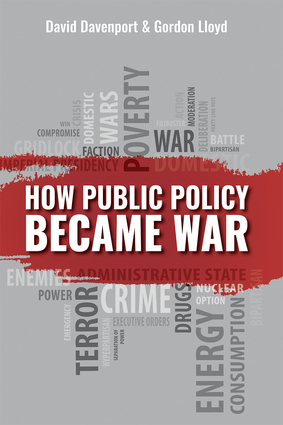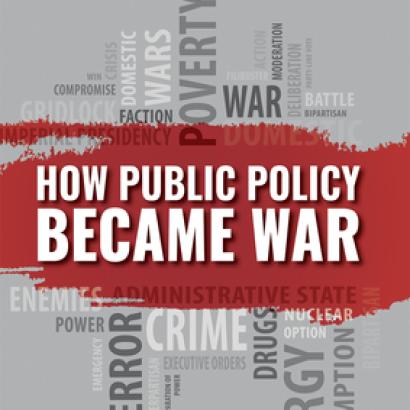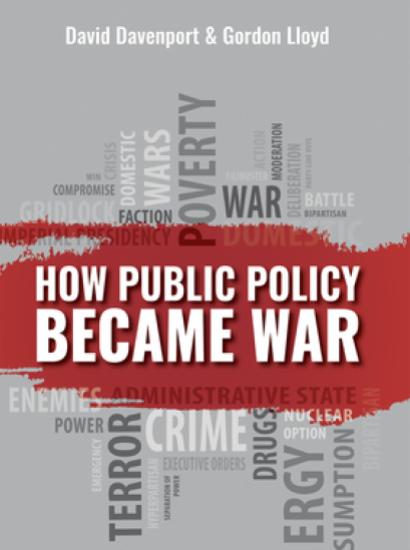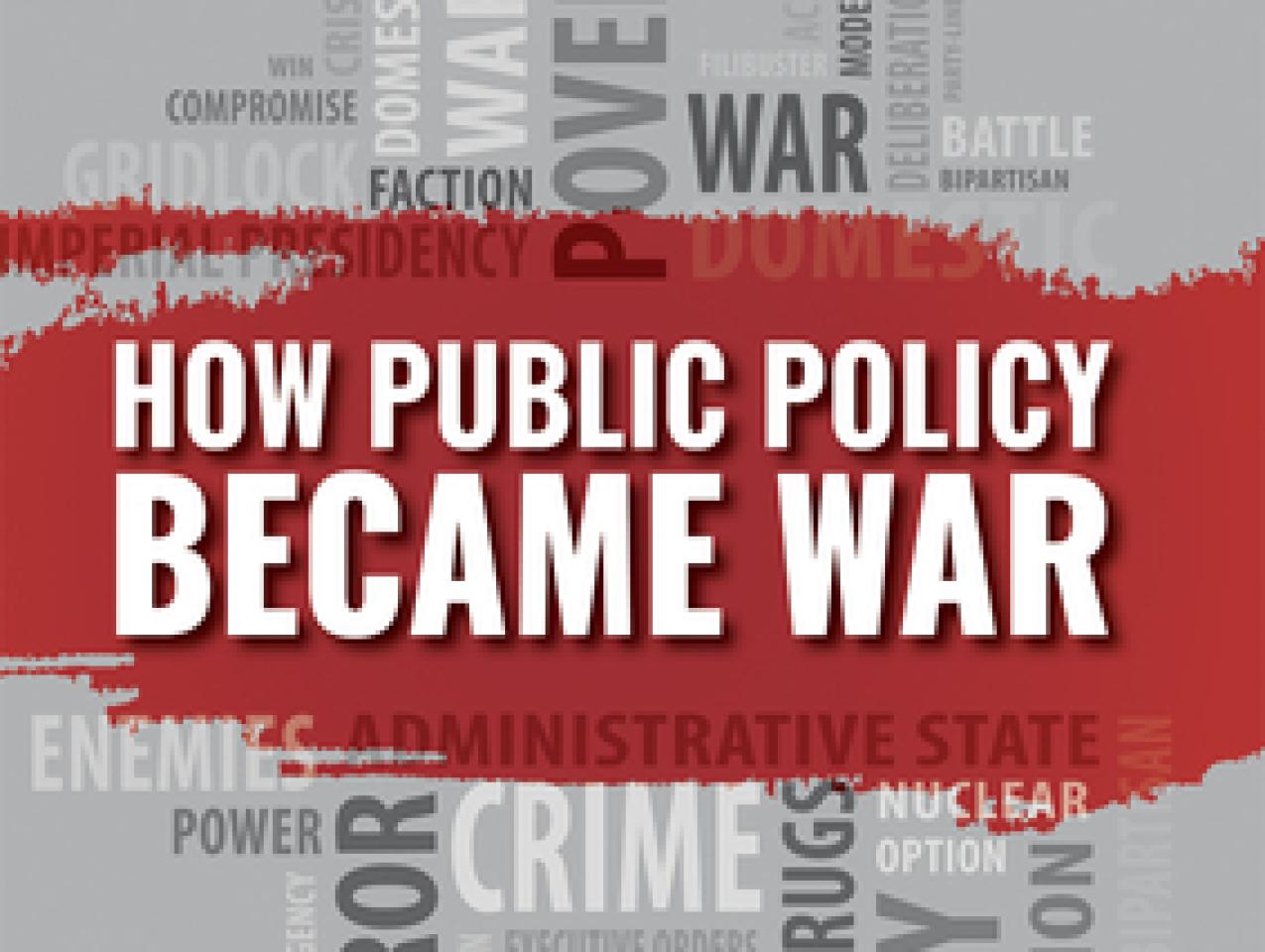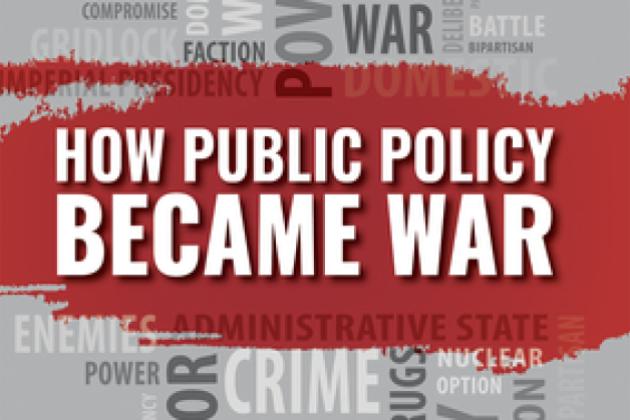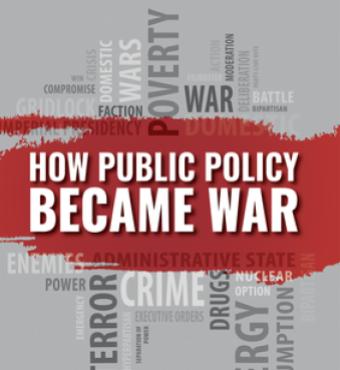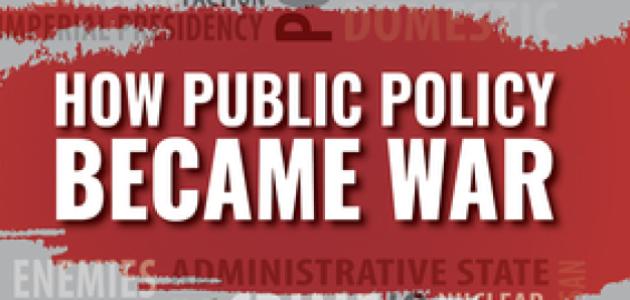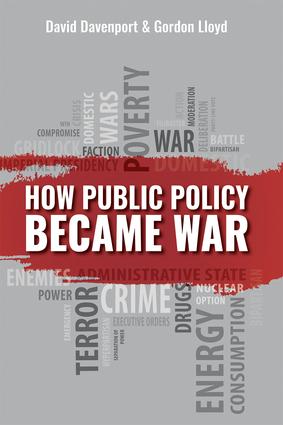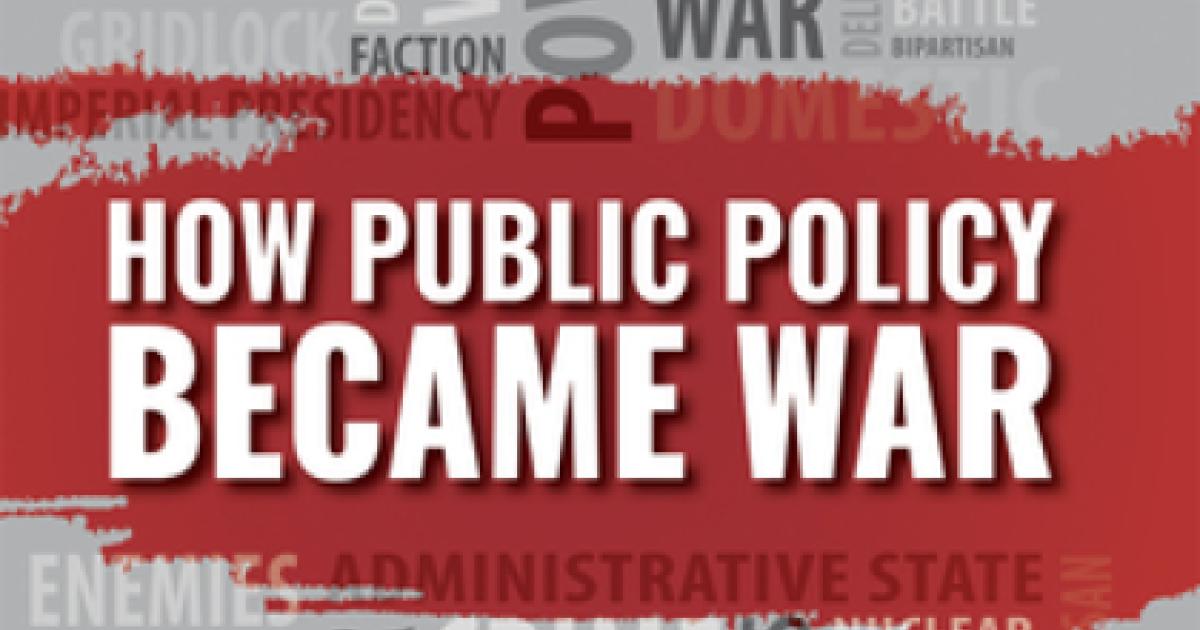Editor’s Note: This is an excerpt from ‘How Public Policy Became War,’ published this week by the Hoover Press.
America is at war, not only abroad but at home. Beginning with Lyndon Johnson in the 1960s, presidents have declared wars on a host of domestic problems: poverty, crime, drugs, and terror, to name a few. War’s close cousin, the national emergency, has also become a way of doing policy business in the United States.
Living in a constant state of domestic war and national emergency has dramatically changed the way public policy is made and conducted in America, which is neither accidental nor beneficial. Presidents have discovered that declaring wars and emergencies is a way of grasping greater executive power at the expense of Congress. Rather than engaging in long-term policy development and debate, presidents can take over a field of domestic policy essentially through speeches and declarations of domestic war. Such wars seemingly never end, since all the domestic wars, beginning with Lyndon Johnson’s War on Poverty in 1963, are still in effect.
The war metaphor itself is a powerful rhetorical tool that has shaped domestic policy. There are troops to muster, enemies to fight, and battles to win. There is little time and opportunity for policy deliberation because, after all, we are at war. In war, the president becomes commander in chief and domestic policies shift from the leadership of Congress to the White House. Few domestic problems are finally solved, so a war on this or that challenge becomes, in effect, a permanent frame for how to deal with issues such as poverty, crime, or drugs. Our leaders in Washington, DC, have fully embraced the war metaphor, so much so that deliberation—which the Founders saw as the key to policy formation—has largely given way to action, emergency, and war.
Metaphors not only communicate ideas but also help shape them. In particular, metaphors have become important in the realm of policy and politics. In immigration policy, for example, we used to think about America as a “melting pot,” with people from many cultures blending, but more recently, it is a “salad bowl,” with groups maintaining their own identity inside the larger society. Politicians sometimes run for office by promoting “wedge issues” such as abortion to energize a base of voters on one side or the other. Donald Trump seeks to “drain the swamp.”
Less well understood is that policy metaphors not only help citizens understand nuances of policy, but they are also used to persuade audiences in one direction or another, and they may ultimately result in setting limits and making choices about policy itself.
A president’s declaration of war on a domestic issue is initially an exercise of the president’s bully pulpit. With modern tools of communication—from fireside radio chats in FDR’s day to the cool medium of television for the telegenic John F. Kennedy, to the great communicator and speech maker Ronald Reagan, and now to Donald Trump’s tweets—the rhetorical power of the president to influence events has become increasingly important, and this is the launching point for presidential declarations of domestic war.
A declaration of war on a domestic enemy starts by rallying the troops—both those inside and outside the Beltway—into a focused attack on a policy problem. Franklin Roosevelt said in his first inaugural address that the American people wanted “action, and action now” to tackle the Great Depression. In his 1964 State of the Union message, President Lyndon B. Johnson declared “an unconditional war on poverty” that would seek to “cure it” and “above all to prevent it.” Presidents from Richard Nixon on have sought to rally the American people and the Congress into wars on crime and drugs. President Jimmy Carter sought a similar outcome when he declared “the moral equivalent of war” on energy consumption, but with less effect.
It is important to note that even at this initial rhetorical level, a declaration of war begins to change the making of domestic policy. First, the president seizes the initiative: this is his program in which he hopes to engage the efforts and support of Congress and the American people. The president engages the topic not at the nuanced level of concrete policy proposals, but at the broader “all hands on deck” level, with the greater emotional commitment of a war. The declaration of a war on drugs or crime is thus more of a political strategy than it is a set of policy prescriptions.
As the war rhetoric becomes more elaborate, its effect moves from the motivational to the descriptive and even the prescriptive. No longer are lawmakers examining the policy nuances and choices presented by complex problems such as poverty or drugs; instead we are moving into immediate action and war. The question becomes not so much what we should do about it and more about how to amass the money and energy to do something. Franklin Roosevelt was not committed to this or that policy on many issues, but instead was focused on “bold, persistent experimentation” leading to “action, and action now.” Lyndon Johnson gathered his staff a month or so before his famous war on poverty address and told them he would carve out money for the effort and that they should figure out how to spend it. With antipoverty policy little understood or developed, his advisers came back with a proposed series of small experiments. Having little patience for small policies, Johnson instead declared an open-ended war with very little policy to implement it. This is typical of how these domestic wars begin: long on rhetoric and short on policy.
The specifics of the war rhetoric, then, begin to shape the policy, not vice versa. Wars need enemies and weapons. Generals and czars must be commissioned to lead them. Battlefields are identified, tactics developed, and victory defined. When Jimmy Carter declared “the moral equivalent of war” on energy consumption, he transformed this domestic challenge into a matter of national security as he called for sacrifices and spoke of imposing sanctions. The war on drugs quickly transformed our nation’s schools into literal battlegrounds over drugs. The war on crime brought military equipment into our nation’s cities and police forces. Without question, declaring war on a domestic problem dramatically transforms both the way policy is made and how it is carried out.
Problems with the War Metaphor
At first blush, one might think that declaring war on intransigent problems such as poverty or crime would be a good thing. As these domestic policy wars have evolved, however, five conclusions become clear: (1) they do not generally solve the problem at hand; (2) they create roadblocks to better policy solutions; (3) they increase executive power at the expense of Congress; (4) their imagery is often negative and destructive; and they never end. In a larger sense, these domestic policy wars also contribute to the contentious policy and culture wars that have plagued Washington in recent years.
A declaration of war on a domestic policy issue is flawed from the outset because it oversimplifies the problem, precluding further debate and the discovery of better solutions. To declare war is to state that, in effect, we understand the problem and we are prepared to do what it takes to eradicate or solve it. Such a declaration necessarily oversimplifies the problem in order to focus and attack, which is the methodology of war. When a president takes a very complex problem—such as poverty, crime, drug use, terrorism, energy—and suggests that we understand it and know how to eradicate it by declaring a war, the process of study, deliberation, and consideration of alternatives is essentially over. We are now in the context of war, where the operative approach is action, not deliberation.
A further problem created by the war metaphor is that such wars are never finally won, leaving the country in a perpetual state of war. If you consider the primary domestic policy wars declared since LBJ’s war on poverty in 1964, they are all still under way. Neither poverty, nor crime, nor drugs, nor terror, nor energy consumption has been defeated, so we fight on, adding new fronts to the domestic policy wars as we go. Since most of these wars span several administrative departments and agencies, no one is tasked with reviewing or reorganizing the war policies, much less sunsetting them or declaring an end of hostilities.
In addition, domestic wars have the harmful effect of shifting the balance of power between Congress and the executive branch. All of these domestic policy wars have been declared by presidents—from Johnson to Nixon to Carter, Reagan, and George W. Bush—and not by Congress. If it is consulted at all, Congress is merely called upon to authorize the funding, but even this step is organized and advanced by the president. Further, because there is no single budgetary line item for a war on poverty or crime or terror, the actual costs of the war are buried in dozens of agency and program budgets, making it even more difficult for Congress to exercise its power of the purse and oversight.
The cumulative effect of thirty national states of emergency under which the country now lives, plus at least half a dozen major domestic wars, is powerful and widespread. Congress is supposed to review the national states of emergency regularly, but it does not. It seems equally important for Congress to review a long-term war—such as that on poverty or crime or drugs—but again that kind of oversight is difficult when presidents declare and sustain these wars on their own authority.
Just Win, Baby
One reason wars, emergencies, and action have overtaken deliberation and compromise is the devolution of policy into a political game with a singular focus on winning. Policy was never devoid of politics, but historically politics came to the fore during campaigns for office and then government leaders settled into the more collaborative process of legislating, with the regular exercise of committee hearings and debates, the consideration of amendments, and resulting compromises.
Today the policy arena has become an extension of the political game of campaigning and the new mantra could be borrowed from Al Davis, the late owner of the Oakland Raiders: “Just win, baby.” Legislators rarely develop relationships with colleagues from the other party, but instead stay within their own party caucus. To the extent that other groups of legislators are formed, there are even narrower interest groups within a party (the Tea Party caucus or Freedom Caucus, for example), rather than bipartisan groups between the parties. Party discipline is at a premium since we often pass important legislation on a purely party-line vote. Rather than compromise, now legislators threaten to shut down the government if they do not get their way. Often the mere threat of a shutdown moves Washington onto a war footing.
Congressional expert David Mayhew has observed that winning the next election would always be important, perhaps the highest priority, for a member of Congress. This has been taken to new highs—or lows—in Washington today. Difficult votes are avoided altogether if they might cause a member to lose ground for reelection. Bills are held by the party leadership, often in secret, until enough party-line votes are available for sure passage. Recalcitrant members may be threatened by the possibility of the party supporting an opponent in their next primary election. There is very little allowance for compromise and, unless necessary, for reaching out to members of the other party. The power in Congress has shifted from committee chairs to majority and minority leaders, who are essentially leaders of their political party. All of this has added up to heightened polarization in Washington and an atmosphere of gridlock and political warfare, not deliberation and compromise to achieve the best policies for the good of all the people.
Managing the War Metaphor
There are several reasons why the war metaphor continues to resonate in Washington. If we think about its coming to the fore under Franklin Roosevelt and the New Deal, some of those conditions still exist. In large part, Roosevelt turned toward the war metaphor because of the deep-seated emergency of the Great Depression and the American people’s clamor for, as Roosevelt put it, “action, and action now.” Although American domestic policy faces nothing like the disaster of the Great Depression, politicians nevertheless create a constant sense of crisis, whether it is immigration and the nation’s borders, or tariffs on imported goods that trigger a trade war, or climate change necessitating new environmental policies, and there are always urgent matters that seemingly require action. Presidents have learned that a sense of crisis or emergency is actually helpful in their moving forward with a domestic agenda, so there is little reason to think that will end anytime soon.
Additionally, Roosevelt moved toward war and emergency to extend presidential power and transform not only domestic policy but also the presidency itself. Roosevelt saw Congress as too slow to deal with emergencies, so it was incumbent on him and his executive agencies to take on more and more responsibility. Beginning with Roosevelt, then, and extending through both Republican and Democratic presidents, there has been steady growth in the accumulation and use of executive power, whether through executive orders, declarations of war and national emergency, extending the president’s war powers, growing the role of the administrative state, and so on. Power in Washington has been traveling a one-way street down Pennsylvania Avenue from the Capitol to the White House for decades.
With these underlying dynamics and motivations toward war and emergency, it seems more realistic to manage the war metaphor rather than expect Washington to give it up entirely, and to put other metaphors and forces into play to help balance it. Congress must claw back powers it has ceded to the executive branch and become once again deliberative. Then, where we, the people live there is a great need for civic education and participation.
We must clean and strengthen filters at the line between the people and their government. The Founders did not establish a direct democracy, but rather a representative government—as Benjamin Franklin put it, “a republic, if you can keep it.” Because faction is sown in the nature of man, the Founders established all manner of filters that let the good things through and stop the bad. Filters cleanse, remove impurities, and interpose a medium between the people and their government. Many of those filters have become clogged and no longer serve their purpose. Restoring and reactivating those filters is a key to managing and minimizing the war metaphor and returning to more positive and deliberative metaphors for public policy in America today.







